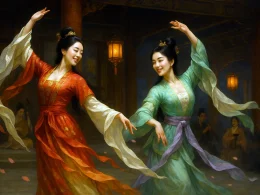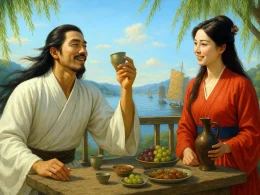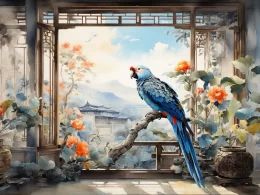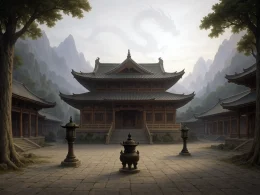The wind lifts the moon through mist’s endless stream,
Frost-laden fog rolls back in hazy dream.
A lifetime’s cares press on my aging heart,
Beyond the sunset’s rim—I stand apart.
Dreams taunt me with roads too far to tread,
No letters come—hope’s deferred like the dead.
Two poems drowned in a cup of clouded wine,
Drunk with gold blooms by this low rail of mine.
Original Poem
「西江月 · 渺渺风吹月上」
渺渺风吹月上,濛濛雾挟霜回。
百年心事老相催。人在夕阳落外。有梦常嫌去远,无书可恨来迟。
吕本中
一杯浊酒两篇诗。小槛黄花共醉。
Interpretation
Composed during Lü Benzhong's years of exile and political vicissitudes, this lyric embodies his melancholic introspection on life's impermanence and time's relentless passage. Written in his later years, it employs autumnal imagery of wind, moon, mist, and frost to convey philosophical contemplation—simultaneously reflecting on bygone days, lamenting the twilight of life, and expressing steadfast devotion to ideals and authentic emotions.
First Stanza: "渺渺风吹月上,濛濛雾挟霜回。"
Miǎomiǎo fēng chuī yuè shàng, méngméng wù xié shuāng huí.
Vast night winds lift the moon ascending,
Swirling mists bear frost in their wake.
The opening establishes an ethereal, chilly atmosphere through reduplicated descriptors ("vast," "swirling") that paint both the expansive autumn nightscape and life's metaphorical obscurity. The moon's ascent and frost's cyclical return mirror time's inexorable flow and nature's eternal recurrence.
"百年心事老相催。人在夕阳落外。"
Bǎinián xīnshì lǎo xiāng cuī. Rén zài xīyáng luò wài.
A lifetime's aspirations age with haste,
This man stands beyond sunset's last glow.
"Century-spanning dreams" (百年心事) compress unfulfilled ambitions, while "aging with haste" (老相催) exposes time's cruel acceleration. "Beyond sunset" (夕阳落外) operates doubly—as physical twilight and spiritual dusk, echoing Song literati's existential melancholy amid dynastic decline.
Second Stanza: "有梦常嫌去远,无书可恨来迟。"
Yǒu mèng cháng xián qù yuǎn, wú shū kě hèn lái chí.
Dreams persist, yet seem ever distant;
No letters come—how the delay grieves!
This antithetical couplet contrasts two human frustrations: ideals receding like mirages ("dreams distant") and isolation compounded by absent correspondence ("letters delayed"). The parallel structure—"have/don't have," "far/delayed," "dislike/grieve"—condenses life's paradoxes into twelve piercing characters.
"一杯浊酒两篇诗。小槛黄花共醉。"
Yī bēi zhuójiǔ liǎng piān shī. Xiǎo kǎn huánghuā gòng zuì.
Turbid winecup, two fresh poems—
At the low rail, with gold chrysanthemums,
We share drunkenness.
The conclusion shifts from lament to lyrical solace. Wine and poetry—traditional scholar's comforts—merge with chrysanthemums (重阳节 symbols representing resilience). Their "shared drunkenness" suggests communion with nature's steadfast beauty despite human frailty.
Holistic Appreciation
This lyric masterfully interweaves autumnal imagery with metaphysical meditation. The first stanza's elemental imagery (wind/moon/mist/frost) constructs a crystalline tableau where natural cycles allegorize life's transience, while "beyond sunset" crystallizes late-life solitude. The second stanza articulates universal human tensions—between aspiration and limitation, connection and isolation—before resolving into art-and-nature transcendence.
The "sunset" motif resonates profoundly within Chinese poetic tradition, sharing emotional valence with Li Shangyin's "sunset infinitely lovely, though twilight nears" and Ma Zhiyuan's "sunset westward sinking, heartbroken wanderer at world's edge." This cultural lexicon imbues Lü's verse with layered historical pathos.
Artistic Merits
- Scene-Emotion Fusion: Chilly landscapes mirror existential contemplation, achieving "scenery as feeling" (以景寓情).
- Philosophical Imagery: Wind/moon/mist/sunset/chrysanthemums form a symbolic network representing time, mortality, and perseverance.
- Laconic Profundity: Unadorned diction belies deep meditation—each word weighted with silent resonance.
- Architectonic Progression: From observational (stanza 1) to introspective (stanza 2) to reconciliatory (close), the structure mirrors emotional navigation.
Insights
The lyric teaches us to confront time's passage with clear-eyed dignity. While dreams may retreat and connections falter, art (poetry), nature (chrysanthemums), and ritual (wine) offer sustainable solace. Like autumn flowers persisting through frost, we too can cultivate quiet radiance amid life's twilight—not by denying darkness, but by kindling inner light against it.
About the Poet
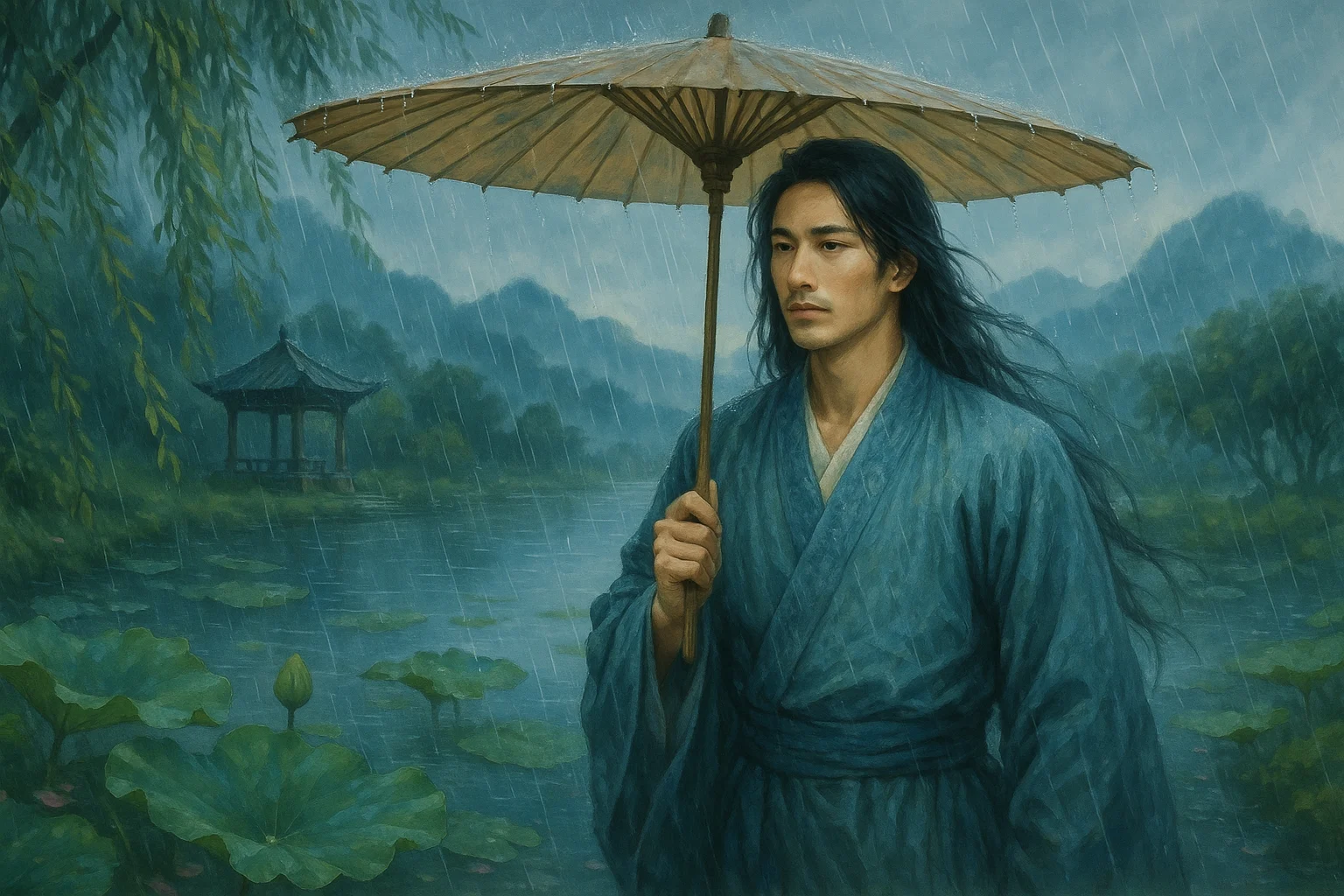
Lü Benzhong (吕本中 1084 - 1145), a native of Shouxian in Anhui, was a renowned poet and Neo-Confucian scholar of the Southern Song Dynasty. As a key theorist of the Jiangxi Poetry School, he proposed the concept of "living method" (huofa), advocating for natural variation within established poetic rules. With over 1,270 surviving poems, his Genealogy of the Jiangxi Poetry School (Jiangxi Shishe Zongpai Tu) established Huang Tingjian as the school's patriarch, profoundly influencing Song poetic theory and serving as a bridge between the Jiangxi School and the Four Masters of the Mid-Song Revival.









